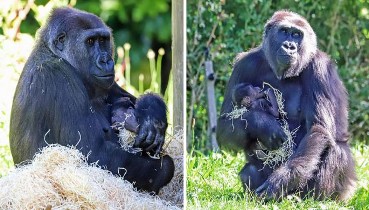
The 5 Most Incredible Archaeological Discoveries Of Recent Times
Archaeologists have found a trove of artifacts at the ancient burial site in Abu Dhab
Archaeologists in Abu Dhabi have unearthed parts of ancient human settlements in the emirate that date back to the Iron Age.
The new sites and artefacts cover a time span from approximately 1300 BC to 600 AD, the Department of Culture and Tourism – Abu Dhabi said.
Experts from the department made the finds during excavations of part of a late pre-Islamic period (300 BC-300 AD) cemetery.
The site, discovered during the upgrading of roads and infrastructure in the Shabiya area of Al Ain, revealed 20 graves that included well-preserved objects, including amphorae – a type of container – and other ceramics, bronze bowls, as well as glass and alabaster vessels.
They also found large quantities of iron weaponry in the graves, including arrows, spears, and several swords, one of which, at 70cm, was preserved intact.
The department said the existence of a cemetery suggests a settlement from the same period was probably located nearby, and the presence of deep underground water channels (aflaj) in the area provides further evidence for the creation of the nearby Al Ain Oasis in this period and the development of the landscape of Al Ain.
It said further antiquities were uncovered during a project along an 11.5km stretch in Al Khrais area.
These include an Iron Age cemetery containing a monumental stone tomb and at least 35 graves. Another area revealed pre-Islamic tombs, one of which had a cache of iron weaponry.
More complete picture
Archaeologists also identified more than 50 ancient aflaj of various dates and construction techniques, evidence of different phases of Iron Age agriculture and the organisation of irrigation systems and agricultural plots.
The department said these ancient fields provide a tangible and relatable link to traditional agriculture systems.
Extensive soil samples were taken from the site, which will provide further information on the use of the ancient environment and the type of crops being cultivated in the Iron Age.
“The exciting recent archaeological discoveries in Al Ain are the result of DCT Abu Dhabi’s ongoing efforts to uncover and protect the rich history of the emirate and the wider nation,” said Mohamed Al Mubarak, chairman of DCT Abu Dhabi.
“We are making significant contributions to knowledge of life in the region during time periods about which little has been known, for example, proof that early settlers in this land implemented agricultural systems far earlier than previously thought.
“Through these undertakings, we continue to obtain a more complete picture of Abu Dhabi’s past, bolstering our pride in the achievements of our ancestors and making valuable contributions to regional and worldwide scientific discourse.”
Other artefacts found in graves and tombs include ceramics related to burials and agriculture, decorated soft stone vessels, jewellery, shells, metals and other weapons.
The department said the pre-Islamic discoveries provide evidence that a period that until recently was relatively absent from the archaeological records in Al Ain is not only present, but seemingly widespread.
In addition, the discovery of swords shows the adoption of new weaponry, which may indicate the rise of horse-borne warfare in the region at that time.
Last year, archaeologists in Abu Dhabi unearthed startling evidence of the first known buildings in the Emirates, dating back more than 8,500 years – at least 500 years earlier than previously thought.
The biggest discovery was revealed by carbon-14 analysis of charcoal fragments, which indicated the structures were at least 8,500 years old – breaking the previous record for the earliest known structures built in the UAE, which were detected on Marawah Island, also off the coast of Abu Dhabi.
Archaeologists in Abu Dhabi have unearthed parts of ancient human settlements in the emirate that date back to the Iron Age.
The new sites and artefacts cover a time span from approximately 1300 BC to 600 AD, the Department of Culture and Tourism – Abu Dhabi said.
Experts from the department made the finds during excavations of part of a late pre-Islamic period (300 BC-300 AD) cemetery.
The site, discovered during the upgrading of roads and infrastructure in the Shabiya area of Al Ain, revealed 20 graves that included well-preserved objects, including amphorae – a type of container – and other ceramics, bronze bowls, as well as glass and alabaster vessels.
They also found large quantities of iron weaponry in the graves, including arrows, spears, and several swords, one of which, at 70cm, was preserved intact.
The department said the existence of a cemetery suggests a settlement from the same period was probably located nearby, and the presence of deep underground water channels (aflaj) in the area provides further evidence for the creation of the nearby Al Ain Oasis in this period and the development of the landscape of Al Ain.
It said further antiquities were uncovered during a project along an 11.5km stretch in Al Khrais area.
These include an Iron Age cemetery containing a monumental stone tomb and at least 35 graves. Another area revealed pre-Islamic tombs, one of which had a cache of iron weaponry.
More complete picture
Archaeologists also identified more than 50 ancient aflaj of various dates and construction techniques, evidence of different phases of Iron Age agriculture and the organisation of irrigation systems and agricultural plots.
The department said these ancient fields provide a tangible and relatable link to traditional agriculture systems.
Extensive soil samples were taken from the site, which will provide further information on the use of the ancient environment and the type of crops being cultivated in the Iron Age.
“The exciting recent archaeological discoveries in Al Ain are the result of DCT Abu Dhabi’s ongoing efforts to uncover and protect the rich history of the emirate and the wider nation,” said Mohamed Al Mubarak, chairman of DCT Abu Dhabi.
“We are making significant contributions to knowledge of life in the region during time periods about which little has been known, for example, proof that early settlers in this land implemented agricultural systems far earlier than previously thought.
“Through these undertakings, we continue to obtain a more complete picture of Abu Dhabi’s past, bolstering our pride in the achievements of our ancestors and making valuable contributions to regional and worldwide scientific discourse.”
Other artefacts found in graves and tombs include ceramics related to burials and agriculture, decorated soft stone vessels, jewellery, shells, metals and other weapons.
The department said the pre-Islamic discoveries provide evidence that a period that until recently was relatively absent from the archaeological records in Al Ain is not only present, but seemingly widespread.
In addition, the discovery of swords shows the adoption of new weaponry, which may indicate the rise of horse-borne warfare in the region at that time.
Last year, archaeologists in Abu Dhabi unearthed startling evidence of the first known buildings in the Emirates, dating back more than 8,500 years – at least 500 years earlier than previously thought.
The biggest discovery was revealed by carbon-14 analysis of charcoal fragments, which indicated the structures were at least 8,500 years old – breaking the previous record for the earliest known structures built in the UAE, which were detected on Marawah Island, also off the coast of Abu Dhabi.
Advertisements
25 October 2023
Advertisements



